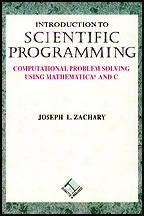Conditionals Tutorial
In this tutorial you will experiment with relational operators,
Boolean operators, and conditional statements in C, as discussed in
Chapter 12. You will be using some example programs in this
laboratory. You can use your Web browser to view or download them as
you prefer.
Take a look at if-1.c. Try to predict
exactly what will be printed out when the program runs. Then compile
and run it and see if you were right.
Here is an explanation, keyed to the example numbers from the comments.
- This is a straightforward if statement. Since the condition is true, the
two statements in the body are executed.
- In this case the condition is false, so the body is not executed.
- This example contains a mistake: a semicolon (;) has inadvertently been
inserted following the condition. Unfortunately, this is a legal C program. C
interprets the semicolon as marking the end of the if, so it treats the
two statements enclosed in braces as the next statement to execute. Since they
are not part of the if, the two statements are executed even though the
condition was false.
- If you don't enclose the body of an if in braces, C will treat
the very next statement as the body. Thus, the second printf always
executes regardless of the value of the condition. Reindent the Emacs buffer
and you will see that the indentation gives you a valuable clue as to what's
going on.
Take a look at if-2.c. Try to predict
exactly what will be printed out when the program runs. Then compile
and run it to see if you were right.
Here is an explanation, keyed to the example numbers from the comments.
- This example shows an if/else. Because the condition is true, the if
part is executed.
- Here the condition is false, so the else part is executed.
- Here there are three choices. The first condition is false, but the
second is true, so the statement that goes with the ``else if'' part is
executed.
- This is another three-way conditional. This time both of the conditions
are true. When this happens, the first true condition takes precedence.
- This example is structured just like example 4, except we have omitted
the ``else'' from the ``else if''. As a result, C treats this as an ``if''
statement followed by a separate ``if else'' statement.
- The body of an ``if'' can itself be an ``if'' statement. This example is
hard to understand until you use Emacs to indent it, when the nesting structure
should make things clear. Remember: the indenting doesn't mean anything to the
C compiler, but it can mean a lot to a human reader.
Take a look at if-3.c. Try to predict
exactly what will be printed out when the program runs. Then compile
and run it to see if you were right.
The only example that requires an explanation is example 7. It is a
common mistake in C to use the assignment operator (=) where the
equality operator (==) was intended. Unfortunately, the result is
often legal C syntax so the compiler doesn't complain. Even though it
is always the case that z == z, the assignment z = z
results (in this case) in the else branch being take.
Take a look at if-4.c. Try to predict
exactly what will be printed out when the program runs. Then compile
and run it to see if you were right.
These examples show how the Boolean operators && (and), || (or),
and ! (not) can be used to compose more complicated conditions.
